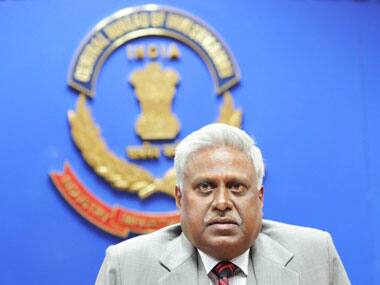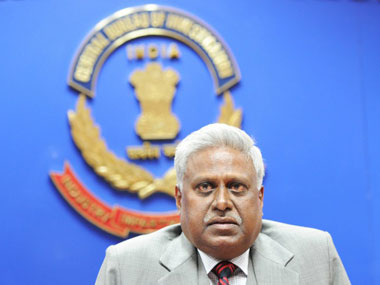CBI Director Ranjit Sinha is under fire for comparing illegal betting in this country to rape. “If you cannot enforce the ban on betting, it is like saying ‘if you can’t prevent rape, you enjoy it’" he said in an unseemly attempt to explain why un-enforceability cannot be used as an argument against the existence of a law. [caption id=“attachment_122735” align=“alignleft” width=“380”]  Ranjit Sinha, who later apologised for the comment. AFP[/caption] Many are furious at this display of insensitivity, all the more remarkable in a senior member of a law enforcement agency and in a society afflicted by appalling levels of sexual violence. CPM leader Brinda Karat wants Sinha to be prosecuted, National Commission for Women Mamata Sharma is demanding his resignation, BJP’s Smriti Irani called the comment "absolutely disgusting" , even biotech titan Kiran Mazumdar Shaw says Sinha “has rendered himself unfit to hold this office.” Sinha isn’t the first worthy to run into trouble over the misuse of ‘rape’. Both the critics and defenders of R-word analogies tend to tread predictable ground. Chetan Bhagat, for example, provoked widespread outrage earlier this year for tweeting, “The rupee is asking, is there no punishment for my rapists?" He quickly backtracked and deleted the tweet, but not without complaint : ““People here flipping out on using word rape as metaphor. Murder is OK. Using F word is also OK.” He is not alone in dismissing such outrage as overwrought and misdirected. South African columnist, Ivo Vegter, went one step further to claim that such “grandstanding by anti-rape activists makes the message commonplace, and the messengers appear shrill. This diminishes their effectiveness when they turn their energies to the very real issues faced by rape victims.” But all this ’tu-tu, mein-mein’ focusing on public figures ducks the more critical issues at hand. For starters, forget Bhagat or Sinha, more alarming is the widespread use of rape as everyday slang. ‘I raped that test,’ is common, as is a ‘we got raped’ message mourning a match outcome. ‘Facebook rape’ is a common term to describe the act of hacking into a friend’s account to post fake updates. It is noteworthy, however, that young men use ‘rape’ more often than women, and worse – as Bhagat’s tweet reveals – interchangeably with fuck. More alarming than the use of rape to indicate a forceful act is the inability to distinguish it from consensual sex. A blurring glaringly evident in Sinha’s quote which assumes that a rape victim can choose to ’enjoy’ the experience of being violated. No one ever suggests that a murder or torture victim can do the same. Bhagat also pointed to an apparent gender bias in rape outrage, noting the lack of response to Shobhaa De’s no-less insensitive tweet: “Dumb questions: If the UPA government is forced to quit, does the Opposition possess a magic wand to fix the rupee-rape crisis overnight.” Fair enough, but while we’re also at it, let’s acknowledge the real gender elephant in the room: man-on-man rape. ‘Usne tho g**** le li’ and other such male rape references are every bit as common as balatkaar jokes. Around the world, men tease each other as ‘bitches’ in a direct allusion to prison rape – underlining the view that the greatest damage to male rape victims is not caused by the itself but the loss of masculinity it implies. The high-decibel indignation evoked by Sinha’s comment disguises just how ’normal’ such rape references are in our everyday language. Rape analogies and references are so routine so as to be invisible. We don’t even notice their inappropriateness most of the time, not even when we’re laughing at the latest rape gag making the rounds. My Firstpost colleague Sandip Roy, for example, cites the joke he received on his BBM soon after the ‘Nirbhaya’ gang rape, riffing on a candlelight vigil at Eden Gardens for the rape of the Indian cricket team. The reality is that demanding Sinha’s head will do little to dent a rape culture that is built into the very fabric of our everyday life. It’s easier to rebuke a public figure on Twitter or on a comment board than to take on a friend, relative, colleague or college mate – all the people we let off the hook because we don’t want to be seen as difficult or un-cool. Real change, like charity, begins at home.
The reality is that demanding Sinha’s head will do little to dent a rape culture that is built into the very fabric of our everyday life. It’s easier to rebuke a public figure on Twitter or on a comment board than to take on a friend, relative, colleague or college mate.
Advertisement
End of Article


)
)
)
)
)
)
)
)
)



